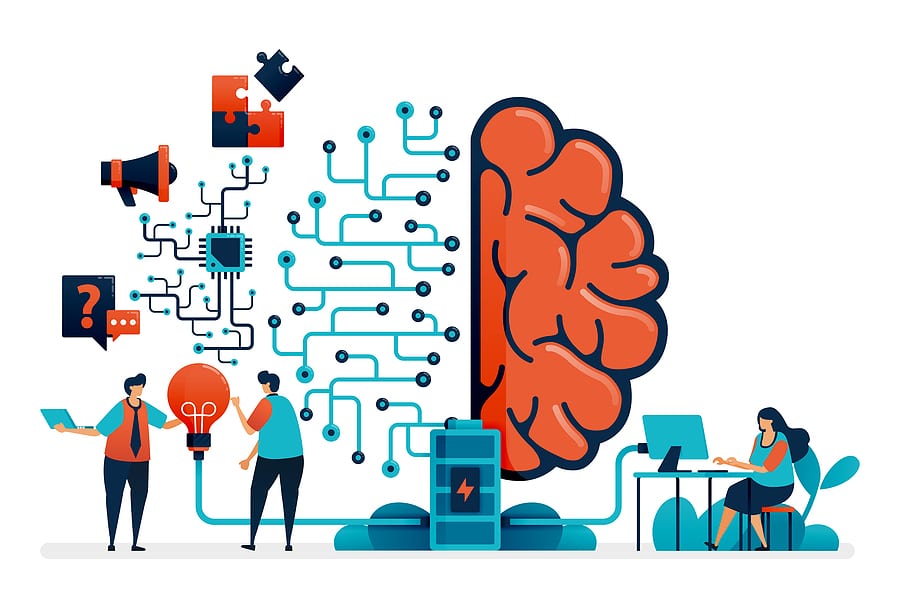How Ecommerce Artificial Intelligence is Changing the Game

Even our social media news feeds and Google searches are driven by AI. Put simply, artificial intelligence is computer programmed algorithms mimicking human intelligence. It gives technology the ability to complete tasks, save us time and personalize our experiences.
Therefore, it’s no wonder why ecommerce artificial intelligence is gathering steam. It’s being used by e-tailers to build customer relationships, provide more curated experiences and optimize operations. If you’re looking for a new strategy to boost your bottom line—with no extra work required—you can try out one of these AI tools that are changing the ecommerce game.
In the meanwhile … Here’s what you need to know.
What is Ecommerce Artificial Intelligence?
Ecommerce AI covers a wide variety of tools that observe online shopper behavior and use machine learning to derive important insights that can be applied to future shoppers. That’s a mouthful… but what does it mean?
In ecommerce, personalization is everything. There are no opportunities for sellers to interact face-to-face with prospective customers the way they would in a store. The only way to capture consumer’s attention is to make them feel seen and understood. That positive feeling will resonate, so they will be more likely to make a purchase. At the very least, they’ll remember your brand.
Artificial intelligence makes this personalization easier. There’s no way to know who is on your website at any given time and how you can manually cater to each shopper, so AI tools do the work for you. Each shopper gets a unique experience based on their browsing activity, past purchases and brand interaction history. These curated “shopping trips” save them time and get them to the checkout page faster. Cha-ching!
Ecommerce AI Statistics
Ecommerce artificial intelligence doesn’t have the longest history, but research has proven time and time again that it’s a powerful tool that changes the online retail game.
Look at these statistics just to get an idea:
- AI drove $8 billion in sales in 2016 and is projected to drive $47 billion this year (Statista)
- 20% of enterprises planned to add AI to their operations last year (PwC)
- AI-driven automation adoption is expected to rise to 80% in the next three years (IBM)
- 20% of consumers are willing to purchase products from chatbots, a form of AI (Ubisend)
- 40% of shoppers use AI to find deals (Ubisend)
Clearly, AI is already making waves in ecommerce and is proving it’s a game changer. Keep reading for some examples of how it fits into your online store.
Chatbots
Customer service is one of the most important parts of an ecommerce business. It is a direct reflection of your brand and an effective way to show your customers you care about any issues they’re having. Top-notch customer service even entices customers to stay loyal.
No wonder recent research reveals that 54% of consumers cut ties with brands that gave them poor service. On the other hand, 77% of consumers recommend businesses that give great service. That’s why savvy e-tailers turn to chatbots.
The reason chatbots appeal to consumers is because they mimic the human interaction that customers seek from live chat and can handle issues on the less complex end of the spectrum. They can also make recommendations, answer questions and upsell or cross-sell. They’re becoming increasingly intuitive—so much so that customers may not even suspect they’re interacting with a bot at all.
What’s more, think tank Forrester found how offering chat improves your business:
- 10% AOV increase when customers engage before making a purchase.
- 48% increase in revenue per chat hour.
- 40% increase in overall conversion rate.
By taking some of the workload off customer service teams across the ecommerce world, chatbots have changed the game.
Product Recommendations
When you’re shopping online and see items that are related to or that pair well with products you’ve looked at in the past, you’re seeing artificial intelligence at work. It’s no accident that the products you see are tailored to your tastes and your browsing history. AI technology tracks shopper behavior and can then suggest products that are “Frequently Bought Together” or “Recommended for You.”
Research shows product recommendations are part of a positive shopping experience, and its benefits e-tailers as well:
- 4 out of 5 consumers enjoy seeing product recommendations.
- Almost half (49%) of consumers have bought something they didn’t initially need because of product recommendations.
- Product recommendations drive 7% of website visits but 26% of revenue on average.
- Shoppers who click on a product recommendation are twice as likely to return.
- 52% of shoppers are willing to share personal data to get product recommendations.
Perhaps the most telling is this statistic: Product recommendations drive over 35% of Amazon’s revenue. This shows how powerful AI can be and how it has already changed the game for an ecommerce behemoth.
Email Personalization
It’s no mystery that personalized emails are a cornerstone of any successful ecommerce marketing strategy. Recipients are 26% more likely to open them, and they drive 14% more click throughs and six times the conversions of non-personalized messages.
Why is this? Because these emails make consumers feel noticed and recognized, so they’re more willing to engage and eventually buy. Email marketing is cost-friendly, too, so personalization drives massive ROI.
Artificial intelligence is what does the personalization for you. A great example of this in motion is a new feature in ReadyCloud Suite called Action Alerts. This feature uses the intelligence that ReadyCloud gains from your inbound customer streams, including purchases, shipping and tracking and returns, to give you the ability to send customized messages, like thank you’s, order updates, shipping and tracking numbers and more. It gives you the ability to instantly send these user-customized messages via email or SMS to keep your brand in sight. It’s also a great way to follow up with customers after so many months to reengage them with your ecommerce brand.

Smarter Search Results
If you’ve ever gone to look something up on Google just to have the search engine finish your query for you, you’ve seen AI in action. Popular platforms like Google, Facebook and Amazon are some of the most common places where consumers will see AI-powered search results, but it’s becoming more prevalent in the ecommerce world as well.
Online retailers have started using artificial intelligence in search in a big way, so shoppers see more personalized and relevant results. The software “learns” how to contextualize searches by tracking users’ responses to the results, and the search engine uses machine learning to improve over time.
Abandoned Cart Recovery
Shopping cart abandonment is $4 trillion problem for e-tailers, but AI can help cut the losses. After all, it’s easy to do—shoppers add items to their carts and then get distracted or otherwise choose not to complete the purchase.
Artificial intelligence comes to the rescue by capturing the data you need to lure shoppers back to your store. You can then use it to your advantage by serving retargeted ads that “follow” cart abandoners around the internet and keep your brand top of mind. If you manage to get their email addresses, AI can send them targeted emails reminding them to come back to their carts.
If you need more tips on how to beat cart abandonment, read our Related Guide to beat the odds.
Visual Search
According to Branded3, image and voice search will make up 50% of all searches by the end of this year. E-tailers will need to adjust their websites to accommodate, and early adopters can increase revenue by 30%.

Image search is a major focus of search engines right now, and it’s changing the game for the apparel and fashion industries. Even retail and pharma are getting a boost they haven’t seen before. This is proving to be a huge opportunity for online retailers of all sizes because it is a new way to get new rankings in search engines and marketplaces.
Before AI, search engines had to rely on metadata and tagging to identify images and documents. Most of the work to optimize images was done manually, but now artificial intelligence can automate image classification and product tagging. Images then become data sources that can contribute to more accurate and aligned search results.
For example, Forbes estimates 80% of social media images that include a brand’s logo have no text mentioning that brand. The disconnect was previously an obstacle for e-tailers trying to gather user-generated content, but AI can now capture this data.
Fighting Fake Reviews
Did you know 37% of consumers rely on product reviews when evaluating a possible purchase? That’s nothing to scoff at. It’s easy to see why e-tailers need positive reviews to build trust and attract new customers. However, fake reviews often get in the way because they are rampant and rarely require verification. But the right amount of legit product reviews can result in a sales uplift of as much as 17%. Here’s how AI can help.

AI is changing the game by highlighting verified reviews and burying the fakes. Amazon built its own system that filters reviews on each product page, highlighting those left by verified buyers. Shoppers can also mark reviews as helpful, which affects how visible reviews are.
Other ecommerce sites quickly followed and added “Verified Buyer” badges to reviews collected from real customers. Now, shoppers can place more trust in the product reviews they’re reading, all thanks to artificial intelligence.
The right amount of verified product reviews have been shown to increase conversions by as much as 60% across the board, so there’s no time like the present to get started on integrated an effective AI solution to help your store get the reviews it needs to succeed.

Comparative & Predictive Shopping
The days when department stores would send out circulars are long gone, but shoppers can still see side-by-side deals on items. It’s just virtual nowadays. Artificial intelligence gathers price points of products offered by multiple stores and shows consumers the findings.
Here’s how this comparative shopping is shaping ecommerce today:
- 63% of all shopping begins online.
- 79% of consumers consider themselves bargain shoppers.
- 78% of shoppers compare prices on multiple sites.
- 60% of consumers were satisfied with the price comparison tools they’ve used.
Predictive shopping, on the other hand, is a bit more sophisticated because artificial intelligence uses gathered consumer shopping data to predict their future behavior. The most recognizable example is Amazon’s Subscribe & Save, which reminds users when they’re likely to need to reorder products. Other subscription box services use this same AI to keep customers coming back for more, and it’s changing the ecommerce game, too.
Exit Pop-Ups
Have you ever made the move to exit a website and gotten a pop-up message asking you to stay? That was artificial intelligence working in the background and then serving a (hopefully) personalized message to try and hook you one last time. The power of AI can assist e-tailers with making these exit pop-ups incredibly targeted, and they are changing the game by boosting conversions by 3% to 11% or more.
Artificial intelligence is always working behind the scenes, giving you a wealth of data to draw from when crafting pop-up messages. This means you can offer product-specific coupon codes on product pages, newsletter signups on your blog posts or shopping cart reminders when shoppers have added items to their carts.
Pagination & Breadcrumbs
Artificial intelligence is also at work when online shoppers use pagination and breadcrumbs. Per our partner, BigCommerce, breadcrumbs are “a form of site navigation that shows visitors where they are on a site’s hierarchy of pages without having to examine a URL structure. Ecommerce stores with many categories can simplify the user experience by displaying breadcrumbs.”
For example, apparel retailer H&M has categorized items into Men and Ladies with further subcategories. As you dive deeper into the subcategories, you can see the digital pathway near the top of the page. These are “breadcrumbs” that leave a trail, and you can follow each one back to broader and broader search results.

Optimizing your breadcrumbs is one of many useful tips you can use to improve ecommerce SEO, but it has benefits that go far beyond search rankings. AI can track shoppers’ browsing behavior and the paths they take through your site by using pagination and breadcrumbs. This then influences product recommendations, search results and even exit pop-ups. It’s all data that can be used to e-tailers’ advantage.
Expect Big Things of Ecommerce AI
Ecommerce artificial intelligence is expected to be a primary driver of sales and to become one of the biggest technology trends we see in ecommerce. It has the ability to improve sales thresholds and lift by as much as 70%, and it appeals more to consumers because it creates “smarter” websites. These tools are just the beginning of AI’s integration into the ecommerce world, and big things are certainly on the horizon.
What You Should Do Now
Here are 3 ways ReadyReturns can help you deliver amazing return experiences that eliminate prepaid labels and boxes, delight customers, and protect your margins:
Schedule a Demo – See how ReadyReturns turns product returns into your competitive advantage with “Amazon-like” returns and cost-saving features.
Start Your Free Trial of ReadyReturns (No CC Required) – Set up in minutes. Instantly offer QR code returns, product exchanges, and custom return rules that turn frustrated customers into repeat buyers.
Try ReadyCloud at No Cost – Why manage shipping and returns separately? Get ReadyShipper X, ReadyReturns, and more in one unified platform for seamless fulfillment and order management.
Share On:








